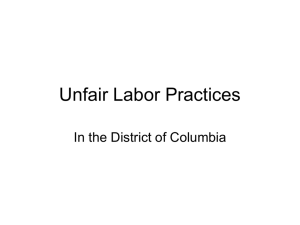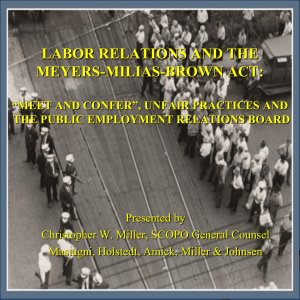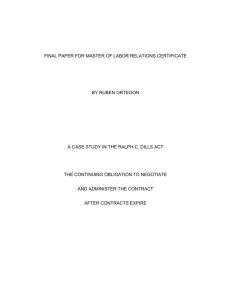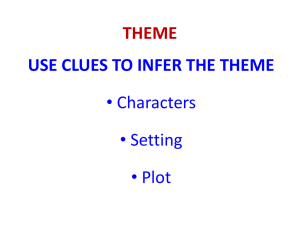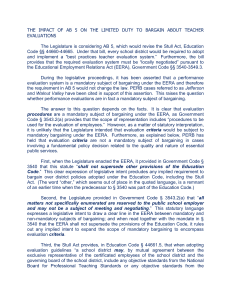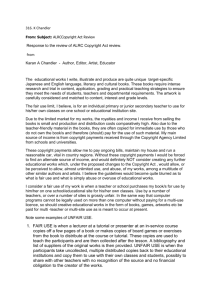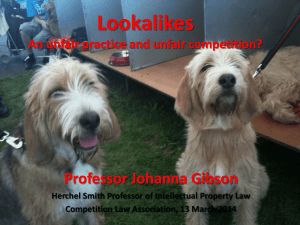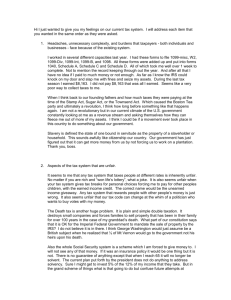unfair labor practice charge- overview and tips
advertisement
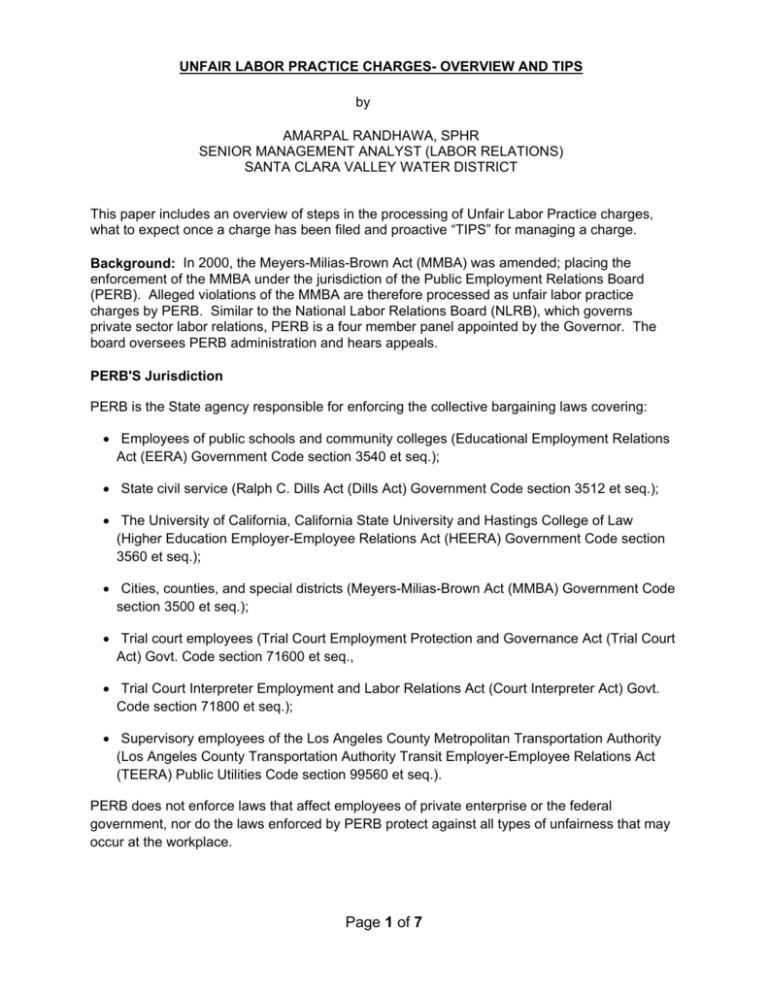
UNFAIR LABOR PRACTICE CHARGES- OVERVIEW AND TIPS by AMARPAL RANDHAWA, SPHR SENIOR MANAGEMENT ANALYST (LABOR RELATIONS) SANTA CLARA VALLEY WATER DISTRICT This paper includes an overview of steps in the processing of Unfair Labor Practice charges, what to expect once a charge has been filed and proactive “TIPS” for managing a charge. Background: In 2000, the Meyers-Milias-Brown Act (MMBA) was amended; placing the enforcement of the MMBA under the jurisdiction of the Public Employment Relations Board (PERB). Alleged violations of the MMBA are therefore processed as unfair labor practice charges by PERB. Similar to the National Labor Relations Board (NLRB), which governs private sector labor relations, PERB is a four member panel appointed by the Governor. The board oversees PERB administration and hears appeals. PERB'S Jurisdiction PERB is the State agency responsible for enforcing the collective bargaining laws covering: • Employees of public schools and community colleges (Educational Employment Relations Act (EERA) Government Code section 3540 et seq.); • State civil service (Ralph C. Dills Act (Dills Act) Government Code section 3512 et seq.); • The University of California, California State University and Hastings College of Law (Higher Education Employer-Employee Relations Act (HEERA) Government Code section 3560 et seq.); • Cities, counties, and special districts (Meyers-Milias-Brown Act (MMBA) Government Code section 3500 et seq.); • Trial court employees (Trial Court Employment Protection and Governance Act (Trial Court Act) Govt. Code section 71600 et seq., • Trial Court Interpreter Employment and Labor Relations Act (Court Interpreter Act) Govt. Code section 71800 et seq.); • Supervisory employees of the Los Angeles County Metropolitan Transportation Authority (Los Angeles County Transportation Authority Transit Employer-Employee Relations Act (TEERA) Public Utilities Code section 99560 et seq.). PERB does not enforce laws that affect employees of private enterprise or the federal government, nor do the laws enforced by PERB protect against all types of unfairness that may occur at the workplace. Page 1 of 7 What is an Unfair Labor Practice (ULP)? An Unfair Labor Practice is an action by an employer or a union that violates the bargaining law. These include interfering with organizing, discrimination against an individual for union activity and bad faith bargaining. Charges alleging an unfair labor practice are filed with PERB relating to employees covered by the state bargaining laws, with the exception of management employees. Following are examples of unlawful employer conduct: • • • • • • Coercive questioning of employees regarding their union activity Refusing or failing to meet and confer in good faith with a recognized employee organization Denying employee organizations the right to represent employees, to secure reasonable release time for employees participating in representation matters Failing to exercise good faith while participating in impasse procedures established in MMBA or local rule Threatening employees or discriminating against employees because they participated in union activities Promising benefits to employees if they refuse to participate in union activity. Definitions of unlawful employer conduct are found for Dills, EERA and HEERA in Government Code sections 3519, 3543.5, and 3571, respectively, for MMBA in Government Code section 3509(b) and PERB Regulation 32603; for the Trial Court Act in Govt. Code section 71630 et seq., including section 71635.1; for the Court Interpreter Act in Govt. Code section 71800 et seq., including section 71822; and for TEERA in Public Utilities Code section 99563.7. Following are examples of unlawful employee organization conduct: • • • • • Threatening employees if they refuse to join the union; Disciplining members for filing an unfair practice charge against the union; Failing to fairly represent an employee in dealings with an employer. Failing to exercise good faith while participating in impasse procedures established in MMBA sections 3505 and 3505.2 or any local rule Refuses or fails to meet and confer in good faith as required by MMBA Definitions of unlawful employee organization conduct are found for Dills, EERA and HEERA in Government Code sections 3519.5, 3543.6 and 3571.1, respectively, for MMBA in Government Code section 3509(b) and PERB Regulation 32604; for the Trial Court Act in Govt. Code section 71630 et seq., including section 71635.1; for the Court Interpreter Act in Govt. Code section 71800 et seq., including section 71822 and for TEERA in Public Utilities Code section 99563.8. Filing the Unfair Practice Charge If you believe that an unfair practice has been committed, you may file a charge by mail or in person at one of PERB's three regional offices. For MMBA, EERA, HEERA, Dills, TEERA, Trial Court Act and Court Interpreter Act, the charge must be filed within six (6) months of the Page 2 of 7 occurrence of the alleged conduct. Unfair Practice Charge forms are available on PERB’s web site or by telephone or at a PERB regional office. Service Take care to follow the instructions for service exactly and use the proper forms. (PERB Regulation 32075). Proof of service forms are available on the PERB web site and at regional offices. Review of the Charge Once the unfair practice charge is properly filed, a Board agent is assigned to review it and determine whether a complaint should be issued. He or she may contact you, the respondent and other individuals for information about the charge. If the charge does not contain sufficient information, the Board agent will give you an opportunity to provide more information or file an amended charge. If you fail to provide the necessary information, your charge is likely to be dismissed. After all information has been received, your charge may still be dismissed if it fails to state a prima facie case (sufficient factual allegations to constitute the elements of specific violation(s)). The dismissal, containing a statement of the reason(s), is mailed to you and the respondent. Appeal of a Dismissal If your charge is dismissed, you may file a written appeal with the Board within 20 days after the charge was dismissed. A proof of service form must accompany each copy of a document served upon a party. Issuance of a Complaint If, after investigating your charge, the Board agent concludes that there are sufficient facts alleged that an unfair practice may have been committed, he or she will issue a Complaint. The case then proceeds to an informal settlement conference. Informal Conference The informal conference is an effort to settle an unfair practice complaint by mutual agreement between the charging party and the respondent. This conference is usually conducted at a PERB regional office by a Board agent other than the one who investigated the charge. The Board agent assists the charging party and respondent in reaching a settlement agreeable to both parties. No records are made and neither party is forced to accept a settlement. If a settlement cannot be reached a formal hearing is scheduled. Helpful Hints • • Before the conference, think about the merits of your case and decide what results would satisfy you. Come with an open mind and be prepared to enter into a meaningful discussion. Page 3 of 7 • Remember: if a compromise is reached at the Informal Conference, the case will be closed and no further action will be required of the parties. Formal Hearing A formal hearing is conducted by an administrative law judge (ALJ) who has not previously participated in the case. This hearing is similar to a court trial. Formal records are kept, and the ALJ, after taking testimony under oath from all relevant witnesses, issues a proposed written decision based on the evidence and legal argument presented by both parties. The parties to a formal hearing have the right to be represented by legal counsel and may request PERB to issue subpoenas for witnesses and documents. If you require legal assistance and advice, contact your legal representative or the nearest County Bar Association for attorney referral services. A proposed decision is binding on the parties unless it is appealed to the Board within 20 days. Helpful Hints • • The charging party must present evidence that proves the allegations contained in the complaint. Plan your case well in advance of the hearing. Know the questions you or your representative will ask and in what order your witnesses will be called. Appeals If you wish to appeal the decision made by the administrative law judge, you may appeal to the Public Employment Relations Board. To appeal, file with the Board a written statement of exceptions which must explain the specific issues of procedure, fact, law or rationale with which you disagree, and identify the page or part of the decision to which each exception is taken. The statement of exceptions and supporting brief (with proof of service) must be filed with the Board in the Headquarters Office (Sacramento) within 20 days following the date of service of the proposed decision. Contact information for PERB's Regional Offices: Sacramento Regional Office 1031 18th Street Sacramento, CA 95811-4124 (916) 322-3198 San Francisco Regional Office 1330 Broadway, Suite 1532 Oakland, CA 94612-2514 (510) 622-1016 Los Angeles Regional Office 700 N. Central Ave., Suite 200 Glendale, CA 91203 (818) 551-2822 Unfair Labor Practices and Employers Unfair labor practices can be summarized through T.I.P.S for employers. Employers can use T.I.P.S to train interviewers, supervisors, managers and employment officers to create a knowledgeable and employee-sensitive workplace. Page 4 of 7 T.I.P.S: • • • Do not taunt, make threats, and interfere with organizing, membership or bargaining activities of employees and their unions. Do not interrogate or make promises to potential hires or employees because of union organizing or membership. Avoid activities that result in punishment of an employee because of union or union-related sentiments or activities. Do not spy on or engage in surveillance or subversion of organizing, membership or bargaining activities of employees and their unions. DON’TS Examples of Unfair Labor Practices Taunt Paul, I thought you were smarter. But here you are, meeting with those bonehead union types. Threaten Paul, if we allow the union to get in here, there will be no more perks like company picnic and free coffee. Interfere Management changes employee lunch time to prevent large groups meeting for organizing activities. Interrogate Paul, we have always had a good relationship. So tell me, what did you guys talk about at the organizing meeting? Promise Paul, if you vote against the union, I will recommend you to fill the next management opening. Punish We don’t promote union organizers into management positions. Spy Paul, I want you to keep an eye on Mary. I think she is trying to organize the workers. Surveillance Paul, I need you to keep me in the loop on all union activities and publications. Behavioral Definitions for T.I.P.S. Training Program Taunts, threats, interrogation, interference, punishment or promises to potential hires or employees because of their union organizing or membership activities are illegal. A threat is an implied or explicit intent to hurt or punish--that is, that an undesirable event may occur because of union activity or sentiment. Employers cannot insult, provoke or treat an employee with contempt because that employee exercises his or her right to unionize. Such expressions of disapproval are illegal because they are taunts with intent to rebuke, censure, disgrace or discredit. Asking an employee questions about his or her union activities or sentiments is interrogation. Such questioning could potentially interfere with, restrain or coerce the employee in the exercise of rights guaranteed by the MMBA. Page 5 of 7 Promises of reward to an employee in order to cease and desist union activity or sentiments may include such things as improving or decreasing benefits while the union is in arbitration/bargaining. Regardless of what the promise entails, an employer cannot make an assurance that it will do or refrain from doing a specified thing because of the employee’s union activities or sentiments. Punishment by an employer would occur if the employer causes the potential hire or employee to suffer because of his or her union activities or sentiments. As described above, a threat is intent to punish. Spying takes many forms. An employer or its agent may act secretly to gather information, by observation or otherwise, about the activities, circumstances and intentions of the union members or the union itself. Or, the employer may enlist the services of an employee as his or her secret agent to spy on the union or other employees or union activities. Conclusion: This information is intended as an introduction to Unfair Practice Charges under different statutes that come under the PERB jurisdiction (EERA, Dills Act, HEERA, MMBA, TEERA, Trial Court Act and Court Interpreter Act). The collective bargaining laws enforced by the Public Employment Relations Board grant certain rights to employees and unions. To ensure these rights, the laws impose obligations upon employers and unions. Unfair practices occur when a party violates the rights of another party or fails to discharge its obligations toward another party. Amarpal S. Randhawa Senior Management Analyst (Labor Relations) Santa Clara Valley Water District 5750 Almaden Expressway San Jose, CA 95118 (408)265-2607 Extension 2507 Email: prandhawa@valleywater.org May 2010 References: Public Employers Relations Board, www.perb.ca.gov Labor Research Association (LRA) Online, www.laborresearch.org Union Resource Network, www.unions.org National Labor Relations Board, Fact Sheet on the NLRB, www.nlrb.gov U.S. Department of Labor – Employment Standards Administration, Office of LaborManagement Standards, www.dol.gov Page 6 of 7 National Labor Relations Board. Retrieved November 25, 2003, from www.nlrb.gov/nlrb/shared_files/brochures/engulp.pdf Society for Human Resource Management, www.shrm.org Page 7 of 7
